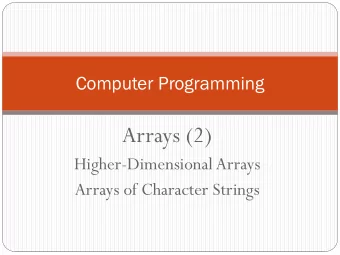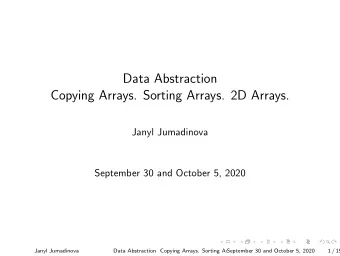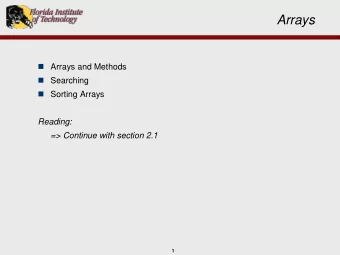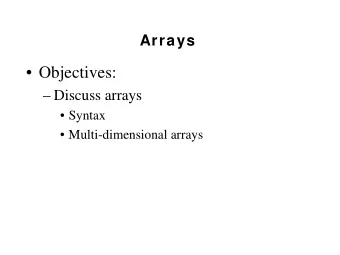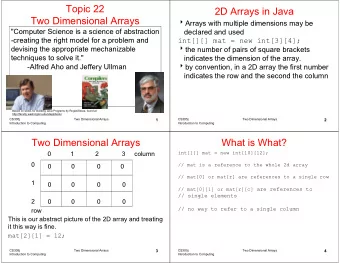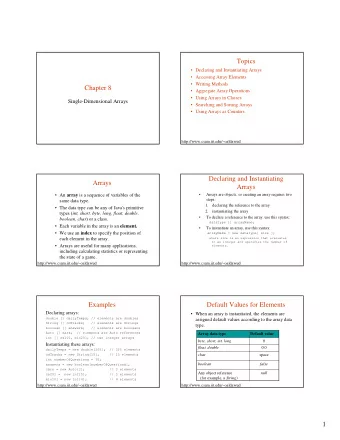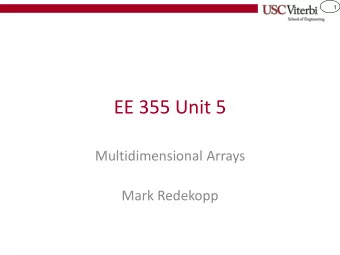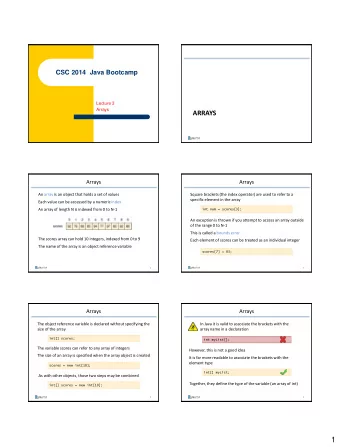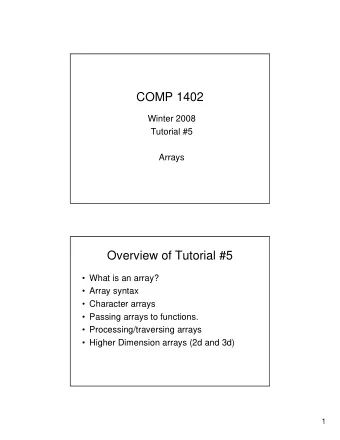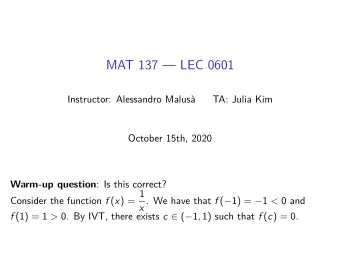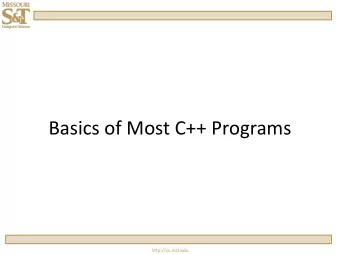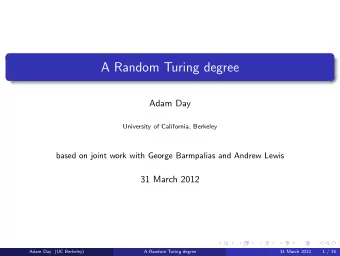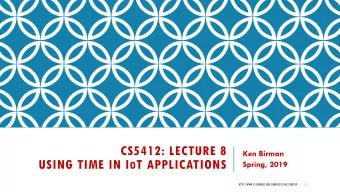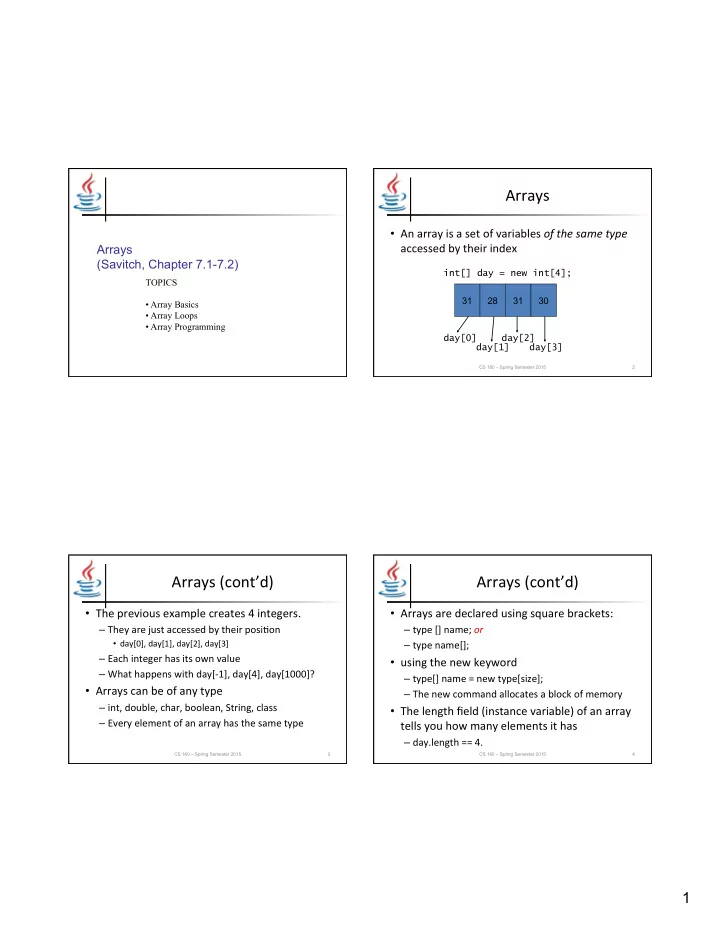
Arrays (contd) Arrays (contd) The previous example creates - PDF document
Arrays An array is a set of variables of the same type accessed by their index Arrays (Savitch, Chapter 7.1-7.2) int[] day = new int[4]; TOPICS 31 28 31 30 Array
Arrays ¡ • An ¡array ¡is ¡a ¡set ¡of ¡variables ¡ of ¡the ¡same ¡type ¡ accessed ¡by ¡their ¡index ¡ Arrays (Savitch, Chapter 7.1-7.2) int[] day = new int[4]; TOPICS 31 28 31 30 • Array Basics • Array Loops • Array Programming day[0] day[2] day[1] day[3] CS 160 – Spring Semester 2015 2 Arrays ¡(cont’d) ¡ Arrays ¡(cont’d) ¡ • The ¡previous ¡example ¡creates ¡4 ¡integers. ¡ • Arrays ¡are ¡declared ¡using ¡square ¡brackets: ¡ – They ¡are ¡just ¡accessed ¡by ¡their ¡posi?on ¡ – type ¡[] ¡name; ¡ or ¡ • day[0], ¡day[1], ¡day[2], ¡day[3] ¡ – type ¡name[]; ¡ – Each ¡integer ¡has ¡its ¡own ¡value ¡ • using ¡the ¡new ¡keyword ¡ – What ¡happens ¡with ¡day[-‑1], ¡day[4], ¡day[1000]? ¡ – type[] ¡name ¡= ¡new ¡type[size]; ¡ • Arrays ¡can ¡be ¡of ¡any ¡type ¡ – The ¡new ¡command ¡allocates ¡a ¡block ¡of ¡memory ¡ – int, ¡double, ¡char, ¡boolean, ¡String, ¡class ¡ • The ¡length ¡field ¡(instance ¡variable) ¡of ¡an ¡array ¡ – Every ¡element ¡of ¡an ¡array ¡has ¡the ¡same ¡type ¡ tells ¡you ¡how ¡many ¡elements ¡it ¡has ¡ – day.length ¡== ¡4. ¡ CS 160 – Spring Semester 2015 3 CS 160 – Spring Semester 2015 4 1
Loops ¡+ ¡arrays: ¡challenge ¡ Step ¡1: ¡Decomposi?on ¡ problem ¡ • Task: ¡read ¡words ¡from ¡input ¡un?l ¡the ¡word ¡ What ¡has ¡to ¡be ¡done? ¡ • ‘quit’ ¡appears. ¡Then ¡print ¡out ¡how ¡many ¡?mes ¡ Ini?alize ¡counters! ¡– ¡another ¡loop ¡ ¡ • each ¡lowercase ¡leWer ¡appeared. ¡ – Read ¡strings ¡from ¡terminal ¡ Nested For ¡each ¡string, ¡ ¡ – loops • Ques?on: ¡where ¡do ¡you ¡start? ¡How ¡do ¡you ¡ For ¡each ¡character, ¡ • approach ¡this ¡problem? ¡ – Increment ¡counter ¡for ¡that ¡character ¡ ¡ Another Print ¡out ¡counts ¡per ¡character ¡ – loop CS 160 – Spring Semester 2015 5 CS 160 – Spring Semester 2015 6 Steps ¡2-‑4: ¡ Step ¡2 ¡(con?nued) ¡ • S?ll ¡ini?alizing ¡counters… ¡ Tackle ¡each ¡step ¡individually ¡ • – The ¡counters ¡count ¡how ¡oden ¡each ¡leWer ¡appears ¡ – Ini?alize ¡counters ¡ – So ¡we ¡need ¡to ¡ini?alize ¡all ¡26 ¡of ¡them ¡to ¡zero! ¡ Declare ¡the ¡counters ¡first ¡ • – So ¡we ¡use ¡a ¡for ¡loop ¡with ¡26 ¡itera?ons ¡ • But ¡there ¡are ¡26 ¡of ¡them… ¡ • … ¡so ¡use ¡an ¡array! ¡ for(int i=0; i < 26; i++) { ¡ int[] alphaCounters = new int[26]; alphaCounters[i] = 0; } CS 160 – Spring Semester 2015 7 CS 160 – Spring Semester 2015 8 2
Step ¡2 ¡(yet ¡again) ¡ Step ¡2 ¡(one ¡more ¡?me!) ¡ • Actually, ¡hard-‑coding ¡’26’ ¡is ¡a ¡bad ¡idea ¡ • So ¡pueng ¡it ¡together, ¡we ¡need ¡to ¡declare ¡and ¡ – What ¡if ¡we ¡want ¡to ¡include ¡capitals ¡later? ¡ ini?alize ¡a ¡counter ¡for ¡every ¡leWer ¡in ¡the ¡ alphabet: ¡ – What ¡if ¡we ¡want ¡to ¡re-‑use ¡this ¡code? ¡ • We ¡want ¡to ¡ini?alize ¡the ¡array, ¡and ¡nothing ¡more: ¡ int[] alphaCounters = new int[26]; int[] alphaCounters = new int[26]; for(int i=0; i < 26; i++) { for (int i=0; i < alphaCounters.length; alphaCounters[i] = 0; i++) { } alphaCounters[i] = 0; } CS 160 – Spring Semester 2015 9 CS 160 – Spring Semester 2015 10 ¡ Does ¡it ¡work? ¡ Prin?ng ¡the ¡Counters ¡ • Did ¡we ¡declare ¡and ¡ini?alize ¡the ¡counters ¡correctly? ¡ • So ¡prin?ng ¡the ¡counters ¡is ¡another ¡loop: ¡ – Never ¡assume ¡something ¡is ¡correct ¡ – Why ¡the ¡trailing ¡println()? ¡ – Test ¡each ¡step ¡before ¡moving ¡on ¡ • How? ¡ – Method ¡#1: ¡Use ¡the ¡debugger ¡ for(int i=0; i < 26; i++) { • Run ¡the ¡code ¡(so ¡far) ¡step-‑by-‑step ¡ System.out.print(alphaCounters[i]+”,”); • Check ¡that ¡the ¡array ¡has ¡26 ¡elements ¡ } • Check ¡that ¡each ¡is ¡set ¡to ¡zero ¡ System.out.println(); – Method ¡#2: ¡Write ¡the ¡code ¡to ¡print ¡counters ¡ • Test ¡it ¡before ¡you ¡start ¡coun?ng ¡leWers ¡ CS 160 – Spring Semester 2015 11 CS 160 – Spring Semester 2015 12 3
Your ¡First ¡Test ¡Code ¡ Running ¡Your ¡First ¡Test ¡ • What ¡should ¡this ¡print? ¡ public static void main(String[] args) { // Declare and initialize counters // Declare & Initialize Counters int[] alphaCounters = new int[26]; int[] alphaCounters = new int[26]; for(int i=0; i < 26; i++) { for(int i=0; i < 26; i++) { alphaCounters[i] = 0; alphaCounters[i] = 0; } } // Print Counters // Print Counters for(int i=0; i < 26; i++) { for(int i=0; i < 26; i++) { System.out.print(alphaCounters[i]+”,”); System.out.print(alphaCounters[i]+”,”); } } System.out.println(); System.out.println(); } CS 160 – Spring Semester 2015 13 CS 160 – Spring Semester 2015 14 Reading ¡Strings ¡& ¡Coun?ng ¡ One ¡approach… ¡ LeWers ¡ • The ¡next ¡step ¡has ¡two ¡parts: ¡ • We’ve ¡already ¡wriWen ¡a ¡loop ¡to ¡read ¡un?l ¡“quit” ¡ – Remember ¡the ¡Echo ¡program? ¡ – Read ¡strings ¡(un?l ¡“quit”) ¡ • So ¡let ¡us ¡start ¡with ¡that: ¡ – Increment ¡leWer ¡counters ¡ Scanner in = new Scanner(System. in ); • Decompose ¡the ¡(sub)problem ¡ while (true) { – Either ¡read ¡strings… ¡ String s = in.next(); • Assuming ¡you ¡can ¡count ¡leWers ¡once ¡you ¡have ¡them ¡ if (s.equals(“quit”)) break; – Or ¡count ¡leWer ¡instances ¡ System. out .println(s); // Replace with counting • Given ¡a ¡string ¡(assume ¡you ¡can ¡get ¡strings ¡somehow) ¡ } Don’t try to do two things at once! CS 160 – Spring Semester 2015 15 CS 160 – Spring Semester 2015 16 4
Wait! ¡Stop! ¡Test ¡this ¡First! ¡ Coun?ng ¡LeWers ¡ • How? ¡ • Given ¡a ¡string, ¡we ¡need ¡to ¡increment ¡a ¡counter ¡ for ¡every ¡leWer. ¡ – Use ¡a ¡print ¡statement ¡to ¡make ¡sure ¡you ¡are ¡ geeng ¡the ¡right ¡strings, ¡or… ¡ – Nested ¡loop ¡inside ¡the ¡get ¡string ¡loop ¡ – Use ¡the ¡debugger! ¡ for(int i=0; i < s.length(); i++) { char letter = s.charAt(i); OK, ¡increment ¡le-er ¡count ¡here… ¡ } CS 160 – Spring Semester 2015 17 CS 160 – Spring Semester 2015 18 Coun?ng ¡LeWers ¡(II) ¡ Coun?ng ¡LeWers ¡(alt) ¡ • The ¡previous ¡code ¡is ¡clean ¡but ¡long. ¡ • Now ¡increment ¡the ¡appropriate ¡counter ¡ • Java ¡supports ¡ASCII ¡char ¡subtrac?on ¡ char first_char = ‘a’; for(int i=0; i < s.length(); i++) char second_char = ‘b’; { int offset = second_char – first_char; // 1 char letter = s.charAt(i); for(int i=0; i < s.length(); i++) switch(letter) { { case ‘a’: alphaCounters[0]++; break; char letter = s.charAt(i); case ‘b’: alphaCounters[1]++; break; int offset = letter – ‘a’; case ‘c’: alphaCounters[2]++; break; if ((offset >= 0) && (offset < 26)) { // 23 more cases… alphaCounters[offset]++; } } } CS 160 – Spring Semester 2015 19 CS 160 – Spring Semester 2015 20 5
Put ¡it ¡all ¡together ¡ All ¡together ¡(II) ¡ // Count letters public static void main(String[] args) { while (true) { String s = in.next(); // Declare and initialize counters if (s.equals(“quit”)) break; int[] alphaCounters = new int[26]; for(int i=0; i < s.length(); i++) { for(int i=0; i < 26; i++) { alphaCounters[i] = 0; char letter = s.charAt(i); } int offset = letter – ‘a’; if ((offset >= 0) && (offset < 26)) // Create scanner alphaCounters[offset]++; Scanner in = new Scanner(System. in ); } } CS 160 – Spring Semester 2015 21 CS 160 – Spring Semester 2015 22 All ¡Together ¡(III) ¡ Done ¡Yet? ¡No! ¡ • Test ¡your ¡program: ¡ // Close scanner – Make ¡up ¡some ¡input ¡ in.close(); – Count ¡the ¡leWers ¡by ¡hand ¡ – Double ¡check ¡your ¡program’s ¡results ¡ // Print Counters • Make ¡Hard ¡Tests ¡ for(int i=0; i < 26; i++) { – Include ¡characters ¡that ¡aren’t ¡leWers ¡ System.out.print(alphaCounters[i]+”,”); – Test ¡the ¡case ¡where ¡the ¡first ¡input ¡is ¡‘quit’ ¡ } – Test ¡really ¡long ¡inputs ¡ System.out.println(); – …. ¡ } • Hint: ¡it ¡can ¡be ¡good ¡to ¡think ¡of ¡test ¡cases ¡ first . ¡ } CS 160 – Spring Semester 2015 23 CS 160 – Spring Semester 2015 24 6
Recommend
More recommend
Explore More Topics
Stay informed with curated content and fresh updates.
